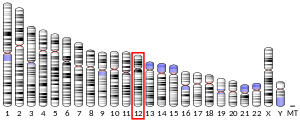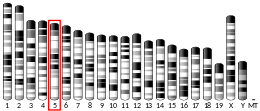ARL6IP4
ADP-ribosylation-like factor 6 interacting protein 4 (ARL6IP4), also called SRp25 is the product of the ARL6IP4 gene located on chromosome 12q24. 31. Its function is unknown.
| ARL6IP4 | |||||||||||||||||||||||||
|---|---|---|---|---|---|---|---|---|---|---|---|---|---|---|---|---|---|---|---|---|---|---|---|---|---|
| Identifiers | |||||||||||||||||||||||||
| Aliases | ARL6IP4, SFRS20, SR-25, SRp25, SRrp37, ADP ribosylation factor like GTPase 6 interacting protein 4 | ||||||||||||||||||||||||
| External IDs | OMIM: 607668 MGI: 1929500 HomoloGene: 9606 GeneCards: ARL6IP4 | ||||||||||||||||||||||||
| |||||||||||||||||||||||||
| |||||||||||||||||||||||||
| |||||||||||||||||||||||||
| Orthologs | |||||||||||||||||||||||||
| Species | Human | Mouse | |||||||||||||||||||||||
| Entrez | |||||||||||||||||||||||||
| Ensembl | |||||||||||||||||||||||||
| UniProt | |||||||||||||||||||||||||
| RefSeq (mRNA) |
| ||||||||||||||||||||||||
| RefSeq (protein) |
| ||||||||||||||||||||||||
| Location (UCSC) | Chr 12: 122.98 – 122.98 Mb | Chr 5: 124.12 – 124.12 Mb | |||||||||||||||||||||||
| PubMed search | [3] | [4] | |||||||||||||||||||||||
| Wikidata | |||||||||||||||||||||||||
| |||||||||||||||||||||||||
Structure
It is 360 amino acids in length. It is expressed ubiquitously but only in G1/S phase of the cell cycle.[5] The human and mouse mRNAs of this protein have 77% homology.[6]
Two types of amino acid clusters have been observed, a serine cluster and a basic cluster.[6]
Function
Its function(s) are unknown. However, due to sequence homology of its protein with SR splicing factors, it is widely believed that the protein is nuclear and may have a role in splicing regulation.[6] The protein is believed to be a mediator in the RAC1 signalling pathway.[7]
RNA editing
The pre-mRNA of the ARL6IP4 gene product is subject to RNA Editing.[8]
Type
A to I RNA editing is catalyzed by a family of adenosine deaminases acting on RNA (ADARs) that specifically recognize adenosines within double-stranded regions of pre-mRNAs and deaminate them to inosine. Inosines are recognised as guanosine by cellular translational machinery. ADAR 1 and ADAR 2 are the only enzymatically active members. ADAR3 is thought to have a regulatory role in the brain. ADAR1 and ADAR 2 are widely expressed in tissues while ADAR 3 is restricted to the brain. The double stranded regions of RNA are formed by base-pairing between residues in the region close to the editing site with residues usually in a neighboring intron but can be an exonic sequence. The region that base pairs with the editing region is known as an Editing Complementary Sequence (ECS).
Location
Editing occurs at a K/R editing site within amino acid position 225 of the final protein. Using RT-PCR and sequencing of 100 individual clones, 7% of isoform 3 of the protein showed a G instead of an A at this position during sequencing. Other minor editing sites may be potentially present including some in the same exon as the major editing site. As is the case of IGFBP7, pre-mRNA, editing is unusual as the RNA fold back structure is made up off exonic sequence only.[8]
Effects on protein structure
Editing at this site results in a codon changed from a Lysine to an Arginine. This occurs in a highly basic region of the protein.[8]
Effects on protein function
The function of the unedited protein is largely uncharacterised. Therefore, the effect of editing on the pre-mRNA on the proteins function is also unknown. The amino acid change is conservative and is unlikely to massively alter protein function. However, the editing site may be important since the amino acid being altered is a Lysine, which may be involved in the regulation of protein expression. Lysines can be sites of post-translational modification and the conversion of Lysine to an Arginine could affect post-translational modification. [8]
References
- GRCh38: Ensembl release 89: ENSG00000182196 - Ensembl, May 2017
- GRCm38: Ensembl release 89: ENSMUSG00000029404 - Ensembl, May 2017
- "Human PubMed Reference:". National Center for Biotechnology Information, U.S. National Library of Medicine.
- "Mouse PubMed Reference:". National Center for Biotechnology Information, U.S. National Library of Medicine.
- "Archived copy". Archived from the original on 2011-07-26. Retrieved 2011-02-14.CS1 maint: archived copy as title (link)
- Sasahara K, Yamaoka T, Moritani M, Tanaka M, Iwahana H, Yoshimoto K, Miyagawa J, Kuroda Y, Itakura M (March 2000). "Molecular cloning and expression analysis of a putative nuclear protein, SR-25". Biochem. Biophys. Res. Commun. 269 (2): 444–50. doi:10.1006/bbrc.2000.2301. PMID 10708573.
- Li Q, Zhao H, Jiang L, Che Y, Dong C, Wang L, Wang J, Liu L (March 2002). "An SR-protein induced by HSVI binding to cells functioning as a splicing inhibitor of viral pre-mRNA". J. Mol. Biol. 316 (4): 887–94. doi:10.1006/jmbi.2001.5318. PMID 11884129.
- Gommans WM, Tatalias NE, Sie CP, Dupuis D, Vendetti N, Smith L, Kaushal R, Maas S (October 2008). "Screening of human SNP database identifies recoding sites of A-to-I RNA editing". RNA. 14 (10): 2074–85. doi:10.1261/rna.816908. PMC 2553741. PMID 18772245.
Further reading
External links
- Kiran A, Baranov PV. "DARNED". DAtabase of RNa EDiting. Archived from the original on 21 July 2011. Retrieved 2011-07-22.
- Human ARL6IP4 genome location and ARL6IP4 gene details page in the UCSC Genome Browser.



